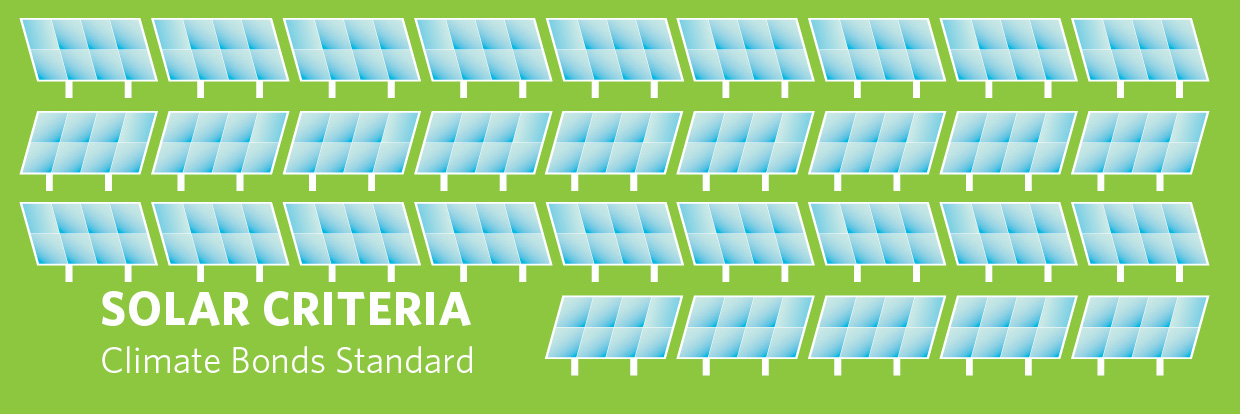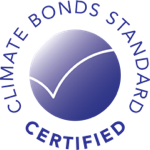
Status: The Solar Criteria is available for use in certifications. Get in contact with certification@climatebonds.net to start the certification process of your Solar green bond.
Financial instruments (bonds and loans) linked to these eligible assets, activities and entities will be aligned with the Paris Agreement and the goal of keeping global temperature rises to no more than 1.5oC above pre-industrial levels.
The Solar Criteria sets out what solar assets may receive Certification under the Climate Bonds Standard and Certification Scheme.
Eligible Assets
- Onshore solar electricity generation
Resources:
1. Solar Criteria Document
2. Solar Criteria Background PaperThe Climate Bonds Standard v4.0
CertificationsTo see the whole list of Solar and other Certified Climate Bonds, visit our Database of Certified Bonds
- Onshore solar thermal facilities
- Transmission infrastructure wholly dedicated to supporting solar generation / thermal facilities
As long as the facility does not have >15% fossil fuel back up.
For more details, select the link to the Solar Eligibility criteria in the resources box.
Offshore solar facilities are eligible for certification under the Marine Renewable Energy Criteria.
To better understand the Criteria, you can also watch this recorded webinar which explains the Criteria in detail.
Development of Criteria: Solar Working Group
The Criteria was developed by a range of experts in the Solar Working Group. Members of this Working Group included:
Alexander Boegle, Manager Finance, Desertec Industry Initiative (DII). Alexander Bögle is Manager Finance at Dii GmbH. He joined Dii in 2012 and is responsible for all finance related topics. He analyses project opportunities and RE regulation from an equity investors and lenders point of view.
Pietro Caloprisco, previously Policy Advisor, European Photovoltaic Industry Association (EPIA). Pietro Caloprisco is currently a Policy Officer at Transport & Environment, having previously worked as a Policy Advisor to the European Photovoltaic Industry Association (EPIA), where he also held a Business Development role.
Dr. Chiara Candelise, Energy Economist, Imperial College London. Dr Chiara Candelise is an experienced energy economist and leading solar energy analyst. Her research interests span from techno-economic assessment of PV technologies to wider economic and policy analysis of energy and climate change issue.
Jenny Chase, Manager, Solar Insight, Bloomberg New Energy Finance. Jenny Chase launched BNEF’s Solar Service in early 2006. She covers demand, supply, price, technology, investment and trends for photovoltaic and solar thermal electricity generation.
Michael Mendelsohn, Senior Financial Analyst, Market and Policy Impact Analysis Group, National Renewable Energy Laboratory (NREL). Michael Mendelsohn is Senior Financial Analyst, in the Market and Policy Impact Analysis Group, at the National Renewable Energy Laboratory (NREL) in the US. Mike's expertise is in Renewable energy financing (particularly CSP and PV), Utility-scale solar development and Electric Vehicles deployment.
Neil Perry, CFO, Solarcentury. He was previously CEO of ING Baring Securities in Argentina.
Cecilia Tam, Senior Energy Analyst, Energy Technology Policy Division, International Energy Agency (IEA). Cecilia Tam is Head of the Energy Demand Technology Unit at the International Energy Agency, where she also leads the IEA’s Energy Technology Roadmaps Programme.
Sven Teske, Engineer/Dipl‐Ing, Energy [R]evolution Campaign, Climate & Energy Unit, Greenpeace International. Sven has been Scientific Advisor for Greenpeace Germany and Renewable Energy Campaigner for Greenpeace Germany, responsible for the development of renewable energy campaigns and renewable energy policies developments, especially feed-in laws and the liberalization of the electricity markets.
Bettina Weiss, Vice President, Business Development, Semiconductor Equipment and Materials International (SEMI). Bettina Weiss is responsible for SEMI’s global product management as well as the association's engagement in new and emerging technology segments and geographies, to support the diverse needs of SEMI members and to assess opportunities for member company engagement in emerging markets.
Philip Wolfe, CEO, WolfeWare. Philip Wolfe is a renewable energy pioneer. He is a former Chief Executive of BP Solar and the former Director General of the Renewable Energy Association. He has also held Directorships at the Aldersgate Group, Renewables Energy Tariff Limited, Own Energy PLC and WolfeWare Limited.
Disclaimer: The Climate Bonds Standard Board operates legally as an advisory committee of the Climate Bonds Initiative Board and oversees the development of the Climate Bonds Standard. Neither the Climate Bonds Standard Board nor any organisation, individual or other person forming part of, or representing, the Climate Bonds Standard Board (together, "CBSB") accepts or owes any duty, liability or responsibility of any kind whatsoever to any issuer which wishes to apply for any of its bonds to be certified under the Climate Bonds Certification Scheme ("Scheme"), or to any issuer whose bonds may at any time be certified under the Scheme or to any other person or body whatsoever, whether with respect to the award or withdrawal of any certification under the Scheme or otherwise. All advice or recommendations with respect to any certification under the Scheme or otherwise that CBSB provides to the Climate Bonds Initiative Board is provided to it in an advisory capacity only and is not to be treated as provided or offered to any other person.
Financial instruments (bonds and loans) linked to these eligible assets, activities and entities will be aligned with the Paris Agreement and the goal of keeping global temperature rises to no more than 1.5oC above pre-industrial levels.
